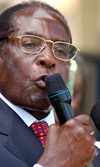
Zimbabwe’s unity government was less than two days old when police arrested Roy Bennett, a high ranking official from Prime Minister Morgan Tsvangirai’s Movement for Democratic Change, or MDC, on treason and terrorism charges. The arrest of Bennett, the MDC’s nominee for Deputy Agriculture Minister, occurred the day he was to assume his new post, is the latest example of the ZANU-PF’s penchant for prosecuting political opponents, and is yet another indication that Zimbabwe’s fragile new government may already be unraveling.
Tsvangirai has been continually demanding for Bennett’s release, calling the arrest “an attempt by hard-liners in (Mugabe’s party, the ZANU-PF) to derail the coalition government.” But Bennett, a white Zimbabwean whose farm was taken as part of the government’s land seizure policy, remains in custody after a judge threw out the treason charges but ruled that the terrorism charges against him were legitimate.
The timing of Bennett’s arrest highlights the continued dissention inside a government clearly unable to tackle Zimbabwe’s myriad challenges. Promises to pay teachers and civil servants in U.S. dollars, and the re-opening to Zimbabwe’s stock exchange are good steps, but they only begin to scratch the surface of the country’s problems. The government’s first cabinet meeting two days ago did nothing more than demonstrate that all parties could successfully sit in a room together without coming to blows; which, although admirable, is just not enough given the country’s humanitarian and economic disasters. How does this country – which is unable to fund meetings for its crucial oversight body – think it can battle a cholera epidemic that is infecting someone new every minute or hyperinflation that has made Zimbabwe’s currency worthless?
Kenya’s Prime Minister Raila Odinga is among those experts highly skeptical of the sustainability of the forced compromise, telling the New York Times, ”I always feared that Mugabe is not a gentleman and I am still convinced he is not…This Zimbabwe deal was modeled on the Kenyan example but I am still convinced that President Mugabe is not President Mwai Kibaki and is not willing to let go of shreds of power.”
It is difficult to fathom that ZANU-PF officials used to unscrupulously reaping the benefits of exploiting government funds would be willing to share nicely. And as rumors of a hard line coup attempt abound, journalists recently kicked off Mugabe’s new palatial compound in a moneyed section of Hong Kong, can’t help but wonder if Mugabe might be doing some contingency planning for a potential retirement.

